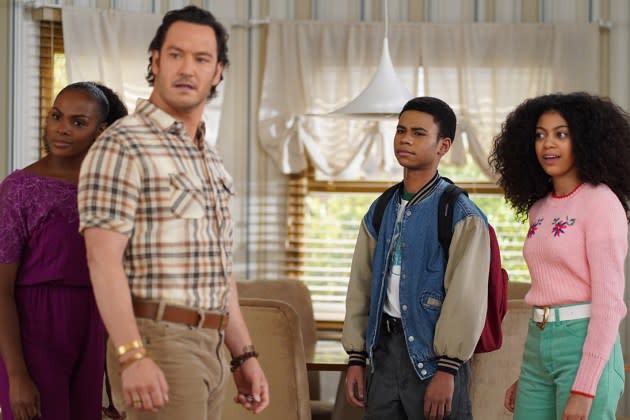‘Mixed-ish’ Creators Prevail In Idea Theft Lawsuit

After a trip to a state appeals court, a lawsuit from actress Hayley Marie Norman accusing ABC, Tracee Ellis Ross and Kenya Barris of lifting ideas from a show she’d been pitching that she alleges was turned into Black-ish spinoff Mixed-ish without her involvement has been dismissed.
The 2nd District Court of Appeal found that the lawsuit shouldn’t have been allowed to proceed against Ross and Artists First, a production and management company that counts her and Barris among its clients. It said, in a ruling issued on Tuesday, that “all of Norman’s claims arise from protected activity,” reversing the trial court and delivering a finishing blow to her lawsuit.
More from The Hollywood Reporter
The G-Wagen Goes All-Electric With an L.A. Bash, Travis Scott Performance and Bradley Cooper Ad
'Diarra From Detroit' Creator Says Show Is a "Beautiful Growing Up" of the Mystery Genre
Tracee Ellis Ross Goes "Mob Wife," Jill Biden Surprises at Fifteen Percent Pledge Gala
In a statement, Michael Plonsker, a lawyer for Norman, said “We strongly do not agree with the appellate decision.”
Norman alleged she pitched her series, a “30-minute sitcom, employing flashbacks, that follows the journey of a mixed-race female protagonist as she grapples with her biracial identity while living in the suburbs surrounded by both sides of her African American and Caucasian families,” in 2017 to production company Big Breakfast, a sister company of Artists First. Brian Dobbins, who was Ross’ manager, then sent the series deck to the actress after Norman suggested that she be brought on as a producer. The project, which got as far as the duo discussing ideas with each other and entering into written agreements with Big Breakfast, stalled after Showtime, Netflix, HBO, Hulu, Amazon and Starz passed on financing it.
Norman sued in 2020 when she learned that ABC was developing a Black-ish prequel that she claims ripped off her ideas for a series she registered in 2016 as Mixed with the Writers Guild of America. She alleged that she shared designs for her show with Big Breakfast, Dobbins and Ross, who allegedly portrayed herself as mentor to her while “plotting and scheming to steal her show and pass it off” as her own. Claims against Big Breakfast centered on allegations that it acted in bad faith by allowing its sister company Artists First to exploit Mixed without involving or compensating Norman.
The court dismissed the lawsuit as to Barris, Dobbins and ABC under California’s anti-SLAPP law, which compels the early dismissal of legal actions aimed at suppressing free speech, but allowed it to proceed against Ross and Artists First. It reasoned that Norman was likely to succeed on her claims for breach of contract, among others, concluding that “evidence of the communication and collaboration among [her], Ross, and Dobbins allows an inference” that they “accepted disclosure of her ideas and materials with the understanding” that she expected to be involved in the series and paid if they were used. Appeals followed.
The appeals’ courts reversal swung on a finding that Norman failed to prove that she was likely to prevail on her claim for breach of implied-in-fact contract, because she couldn’t show that she had an agreement with Ross and Artists First. It said that they didn’t accept her ideas on the condition that they’d be expected to pay for them.
The conclusion was based on Big Breakfast passing Norman’s ideas for the show around to others without conditioning acceptance on payment or involvement. Norman entered into a contract with the production company for the exclusive rights to Mixed but not Artists First or Ross, who got the materials from Dobbins. In a court declaration, Dobbins stated that he was not told of any conditions relating to the show or that the ideas for the series were Norman’s proprietary property.
“Ross entered into a written agreement with Big Breakfast to help develop [Mixed] and pitch it to financiers, which she did,” the order stated. “This evidence does not support a finding that Ross and Artists First agreed to receive [Mixed] pursuant to an agreement that they were expected to pay Norman for her ideas.”
The court noted that Norman asserted that her materials for Mixed could only be used upon her express consent, suggesting that she didn’t offer her ideas under the condition of obligation for payment.
On the issue of whether Mixed and Mixed-ish are substantially similar — which the trial court found in favor of Norman on since both works focus in part on a mixed-race character navigating life, interracial dating and microaggressions — the appeals court said that certain similarities should be filtered out because they were created before she thought of or shared her ideas. Many of the alleged overlaps between the two series were first brought up in Black-ish, including the central character in the spinoff, the justices stressed.
Regardless, the appeals court said that the alleged similarities are “very general, high-level elements” that shouldn’t be considered in an analysis of whether the works are substantially similar.
Since the lawsuit was dismissed under anti-SLAPP, Norman was ordered to pay roughly $62,000 in legal fees for Barris, Dobbins and ABC.
In 2018, Barris was sued by a former writing partner for allegedly stealing the concept for Black-ish. The two sides settled shortly before trial.
Best of The Hollywood Reporter

 Yahoo News
Yahoo News 